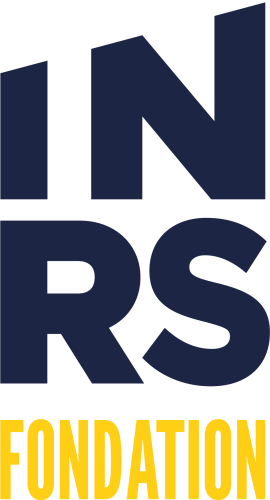Université du Québec scholarship recipients
Five INRS students have been awarded a Université du Québec scholarship in recognition of the diversity of our student community. Canisius Fantodji, Osis Riol Gonzalez, Alexanne Léveillé, Mackenzie Anne Clifford Martyniuk, and Fares Saidi are the recipients of $3,000 bursaries, which will complement their study conditions.
Congratulations to all our recipients! A friendly awards ceremony will be held in the various research and training centers this fall, during which members of the community will be able to celebrate the success of our award winners.
The Foundation team asked them a few questions to help you discover them.
Canisius Fantodji, PhD student in epidemiology and immunology
What brought you to INRS? Tell us about your experience.
As part of my master's degree in epidemiology at the Institut de santé publique, d'épidémiologie et de développement (ISPED, France), I decided to carry out my research internship at the Institut national de la recherche scientifique (INRS), in Professor Marie-Claude Rousseau's laboratory. It was this experience that introduced me to INRS and the research it conducts. The quality of my supervision and the scientific rigor advocated by the researchers in the Epidemiology and Biostatistics Unit convinced me to pursue my doctoral studies in this research laboratory. Today, I can tell you that INRS is an excellent setting for training and research.
Can you describe the research challenge and impact of your doctoral project?
My doctoral research project focuses on the etiological factors of inflammatory bowel disease. These are incurable chronic diseases whose causes have not yet been fully elucidated. With over 270,000 cases of inflammatory bowel disease, Canada is one of the countries most affected. These diseases are responsible for an increase in surgery, hospitalization and early death. This doctoral project, co-supervised by Prof. Marie-Claude Rousseau of INRS and Prof. Prévost Jantchou of CHU-Sainte Justine, will contribute to a better understanding of the relationship between certain immunological and environmental factors and the onset of inflammatory bowel disease. The results of this project will provide essential elements for the development of prevention recommendations. The biostatistical approach used in this study, which focuses on the timing of environmental exposures, is innovative and will help to better target preventive actions.
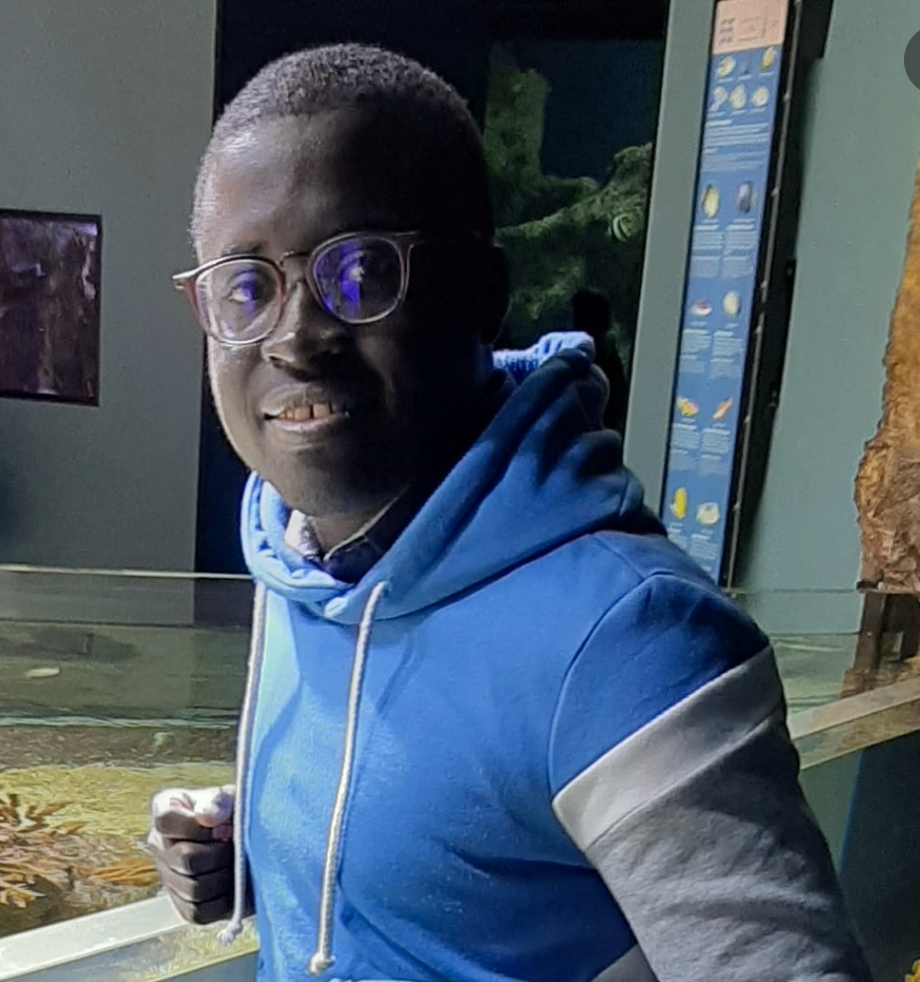
I am so happy to be a recipient of the Université du Québec Scholarship. For me, this represents the fruit of my academic and scientific achievements over the last few years. I'm very grateful to the INRS Foundation for setting up this scholarship program to support research and promote access to university studies. This funding enhances my study conditions at INRS and will contribute to the success of my doctoral studies.
How do you see the future?
To date, I've completed my schooling. I'm currently working on my research project. I'm going to continue my research activities by writing scientific articles and my doctoral thesis.
Osiris Riol Gonzalez, master’s student in urban studies
What brought you to INRS? Tell us about your experience.
My atypical career path led me to the Centre Urbanisation Culture Société at INRS, where I found an academic community open to multidisciplinarity. After obtaining my bachelor's degree in foreign languages at the University of Havana, I developed professional expertise in the field of urban and cultural tourism in Cuba.
It was during the INRS virtual open house in 2021, on the advice of a friend who was doing her master's here, that I discovered that my research interests dovetailed perfectly with those of the Fernand-Dumont Chair in Culture (Culture, Cities and Territories axis) and the Master's in Urban Studies. I was so enthusiastic about this convergence that I contacted Professor Christian Poirier, who is now my research supervisor.
I've been passionate about cultural issues ever since my first research experiences in undergraduate studies. My program of study has enabled me to deepen my knowledge and explore issues I'm passionate about.
From my experience, I retain the excellence of the professors, the quality of the courses and our multicultural and dynamic student community. These elements play a key role in my scientific and personal growth.
Can you tell us about the challenge and impact of the research at the heart of your Master's project?
My project seeks to better understand the role of the territorial dimension in the deployment of cultural citizenship among young people participating in amateur artistic projects in different neighborhoods on the island of Montreal. My research aims to examine how their participation in these projects can strengthen their sense of belonging and contribute to their identity-building in relation to their neighborhood and city.
My research will provide important insights into how territory influences young people's cultural participation and the inequalities that persist. By understanding young people's perceptions of territory, local involvement and experience in these projects, we will be able to provide leads for promoting more inclusive cultural participation.
In addition, this research will deepen our understanding of cultural citizenship and its deployment through arts and culture among young people. It will help identify the key factors that foster their engagement and involvement in their community, while strengthening the social and cultural ties between participants. This can have a positive impact on the development of cultural policies and initiatives that respond to the needs and aspirations of young people, promoting their active and meaningful participation in the cultural life of their territory.
Winning this scholarship is an opportunity that frees me from some of my financial constraints, allowing me to focus on my research and academic goals. It's an invaluable support that will have a positive impact on my training, motivation and success in my graduate studies.
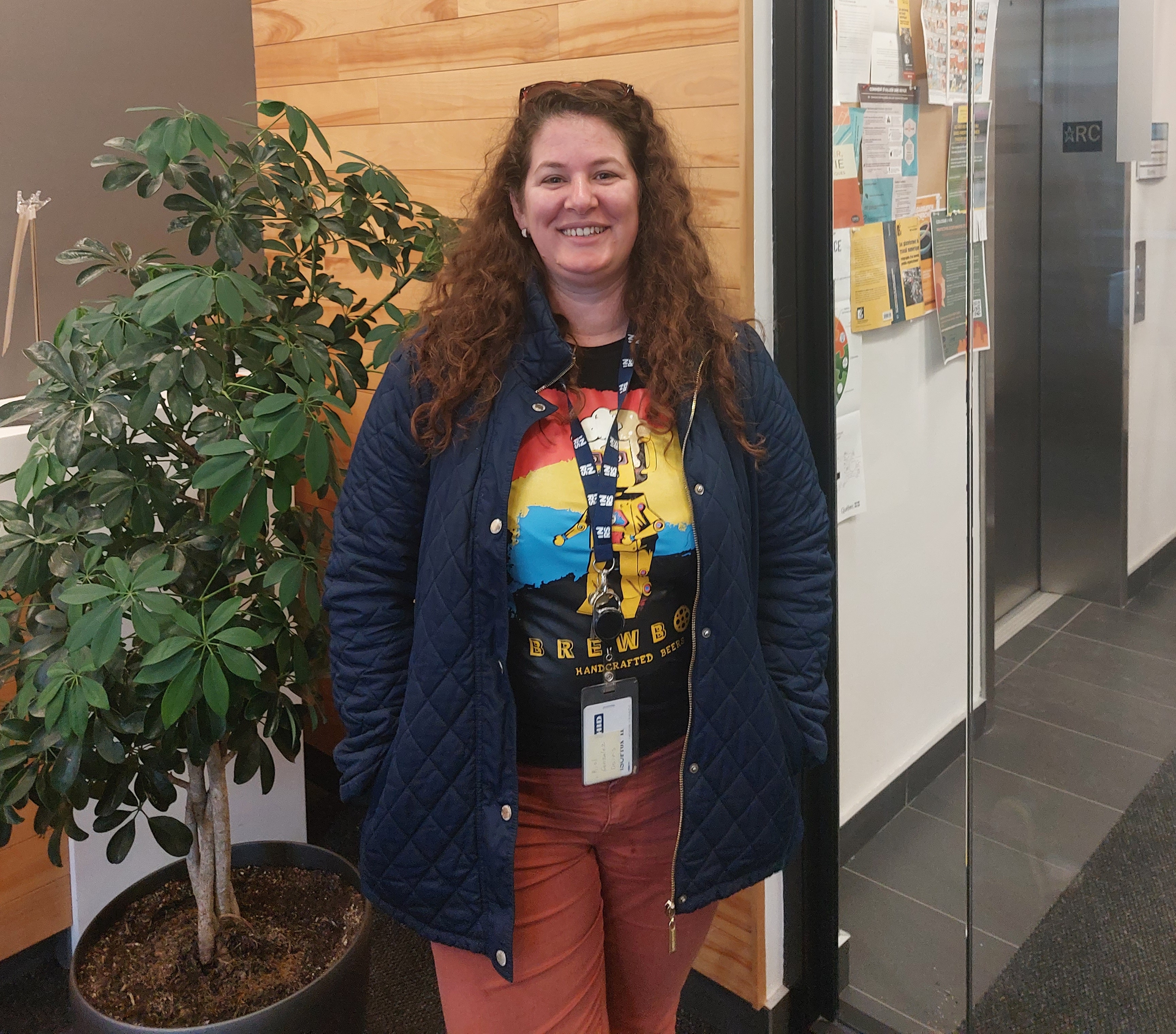
How do you see the future?
I've just started my pre-field work and I'm looking forward to continuing my research project. I'm excited to keep moving forward and learn more about my subject.
Alexanne Léveillé, master’s student in experimental health sciences
What brought you to INRS? Tell us about your experience.
My background is a bit unusual. I first enrolled in visual orthotics at CEGEP, where I got very involved in student life. I finally realized, thanks to the many biology courses I took, that what interested me was understanding the world around me and the mechanisms that explain different biological phenomena. So I became very interested in immunology. I then enrolled in a problem-based biology course at UQAM, which enabled me to acquire not only knowledge, but also a work ethic and method. The bachelor's degree enabled me to develop my critical thinking and research skills, as well as giving us access to laboratories from the very first year. I then obtained an internship with one of my professors at UQAM, but it had to be cancelled due to covid.
While I was looking for research internships, I received an e-mail from INRS saying that they had openings for undergraduate summer internships and that these came with a bursary. So I applied for the internships and also targeted a few professors with projects of interest to me at the Centre Armand-Frappier Santé Biotechnologie. I had identified Professor Denis Girard's laboratory, as I was particularly interested in his research topic. I received a positive response from him and he invited me to do a summer internship in his laboratory, with the possibility of staying on to do my master's if all went well. For this internship, I was awarded an NSERC Excellence Scholarship. I really enjoyed my experience and immediately felt at home in the lab. In fact, I never left the lab again and decided to do my master's and doctorate here.
I'm lucky enough to have an excellent mentor and an interesting project, which allows me to develop as a young researcher. In fact, I'm not only acquiring knowledge, but also know-how and a working method through my research. I also particularly like the fact that my program is research-based, which gives me experience that will be useful in my future career in research. Being so in touch with research also keeps me motivated to continue my studies.
Describe the challenge and impact of the research presented in your master’s project?
I'm doing my research on neutrophils, particularly on the role of the cytoskeleton in their physiology. Neutrophils are the most abundant white blood cells in the body. In fact, they make up around 70% of all our white blood cells. They act as first responders to infection, injury and other attacks. However, they are highly effective, but not very selective in the means they use, which can cause damage if left unchecked. If dysregulated, they can be responsible for intense inflammatory reactions and can destroy healthy tissue. They therefore need to be controlled, which is achieved by, among other things, their programmed death, apoptosis, and their elimination by other cells.
I'm focusing in particular on the mechanism by which macrophages eliminate apoptotic neutrophils, known as efferocytosis. This reduces inflammation and induces a "tissue repair" mode. We are particularly interested in whether this mechanism involves the recognition of certain cytoskeletal proteins present on the surface of apoptotic neutrophils. We also want to know whether certain xenobiotics, particularly nanoparticles, can affect this mechanism and the presence of these proteins on the neutrophil surface. This research will provide further insight into the mechanism behind efferocytosis and the resolution of inflammation.
Cytoskeletal proteins are also implicated in the development of several autoimmune diseases, and the reason for their presence on the surface of apoptotic neutrophils is still a mystery. Exposure following apoptosis may also be one of the mechanisms favoring the development of autoantibodies. This research could also improve our knowledge of the subject.
In short, my research is very fundamental. Our aim is to improve our understanding of the complex mechanisms associated with the resolution of inflammation and the physiology of neutrophils. This knowledge can then be used to potentially develop treatments for certain inflammatory diseases, or to better control the use of nanoparticles.
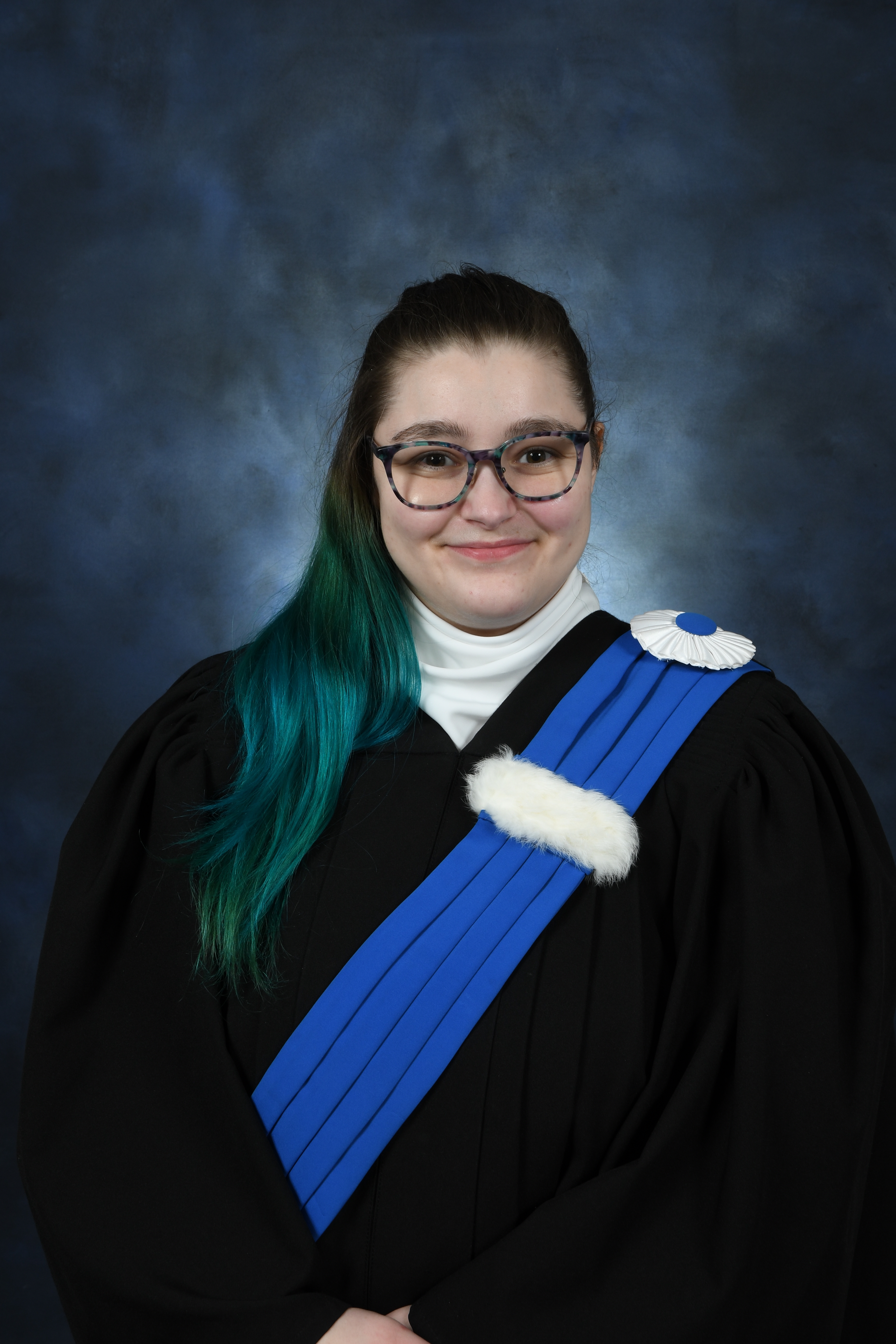
I’m really happy to win this scholarship. It’s recognition of the effort and hard work I put into my research and studies. It will enable me to concentrate more on my work as a research student, while reducing the financial stress. I’m grateful that INRS, the Foundation, and the Université du Québec recognize and promote access to higher education for people with disabilities. I hope to be a role model for young people wishing to pursue a career in science despite one or more disabilities. I’m fortunate to live in a very inclusive environment, and this scholarship reflects that.
How do you see the future?
In Experimental Health Sciences, we are fortunate enough to be able to fast-track our studies towards a PhD in Biology, provided we have completed the courses, maintained a good average and obtained the approval of the research director and the program following the seminar presentation. I'm going to follow this path to pursue my doctoral studies, still under the supervision of Prof. Denis Girard. I will continue to study the effects of the cytoskeleton on neutrophil physiology. However, I'd like to take a closer look at the effect of nanoparticles on the cytoskeleton, and do more work on autoimmunity.
I'd also like to continue sharing my journey with young people. Indeed, one of my goals is to continue to take part in events where I can demystify the world of research and show high school and college students that it's possible to study science despite a disability or a different background.
Mackenzie Anne Clifford Martyniuk, doctoral student in water sciences
What brought you to INRS? Tell us about your experience.
During my master's degree at the University of Waterloo, my current thesis supervisor, Prof. Patrice Couture, was my co-supervisor. As a result, all my trace metal analyses (an essential component of my project) were carried out here at INRS. I remember wandering around Quebec at the time I was here to visit INRS and thinking "it would be amazing to be able to do my PhD here in this city", but I never thought it would be a possibility as I am an English speaker.
Anyway, as I was nearing the end of my master's degree. Patrice called me and said he had received funding for a project and would like to offer me a PhD position. I was thrilled and honored that he'd thought of me, but my first question was, "but my French isn't perfect, how would that work?" He assured me I would learn, and four years later, now, I'm so grateful for the opportunity and the confidence he had in me to succeed.
What I take away from my experience will always be the people I met and worked with along the way. A PhD has so many ups and downs and moments that make you wonder why you made such a commitment. It's in these moments that you remember those who love and support you, and that's what gives you the strength to keep going.
Can you describe the challenge and impact of the research presented in your PhD?
When subjected to thermal stress, fish are less resistant to contaminants. Therefore, it is assumed that climate change will have negative effects on the health and condition of fish in areas close to mining operations. However, previous research examining these combined stressors has generally been limited to more temperate species, although fish distributed further north are of significant cultural and economic importance to local communities. Therefore, using both field and laboratory studies, this research aims not only to increase the availability of ecotoxicological knowledge detailing the uptake and handling of trace metals in northern salmonids, but also to establish critical thresholds of metal contamination for northern salmonids in association with predicted temperatures under climate change models.
The field component of the study involved the collection of water, sediment, invertebrate and fish tissue from areas affected by mining operations in the Nord-du-Québec region (Fermont and Schefferville Québec), as well as reference locations. The samples collected will help detail the current extent of trace metal contamination in areas close to mining operations in northern Quebec, and further our understanding of ecotoxicological impacts on fish health and condition through the assessment of biometric indices, enzymatic biomarkers and stable isotopes. Data collected from these field studies were then used to establish environmentally relevant baselines to inform the project's laboratory studies, which focus on determining critical thresholds of metal contamination. This was accomplished by assessing the same fish health and condition indicators studied in the field component of the project after Arctic char were subjected to both combined heat and trace metal stressors via cadmium exposure experiments at current (6°C) and summer temperatures expected (16°C) for this species. Preliminary results from these experiments suggest that climate change may pose an increased health risk to salmonids located near mining operations. Finally, all field and laboratory data will be modelled in conjunction with summer surface warming forecasts to determine critical scenarios for salmonids in Northern Quebec.
Overall, this research is essential to ensure the continued preservation and enlightened management of these culturally and economically important species, with results having the potential to eventually be extrapolated to other salmonid populations throughout the circumpolar Arctic. Furthermore, the limited accessibility of previously published scientific literature in our field of study, ensures that our research is essential to identify the needs for environmental protection and responsible development of natural resources with an emphasis on indigenous community participation, all essential components of the project when carrying out research in a northern context.
What does winning this scholarship mean to you?
You're probably aware that scholarship amounts for master's and doctoral students in Canada have been stagnant for over 20 years. What's more, annual stipends of $17,500 per year for a master's student or $21,000 per year for a doctoral student are well below Canada's poverty line. However, when you combine this information with Canadians' rising expenses in almost every aspect of their lives, it's easy to understand why so many of us are one paycheck away from not being able to pay our rent or buy groceries for the month. This situation is beyond tragic, and adds immeasurable stress to an already stressful situation (schoolwork). If the Canadian government doesn't give priority to its students, we risk losing so many future scientists to other countries, because higher education in Canada is no longer financially feasible.
On a more personal note, although I receive a doctoral scholarship from INRS, like most students, it's not enough to cover all my expenses given our current financial climate. Also, like most graduate students, I work about 50-60 hours a week, so I don't have the time to get an extra job. So I've taken out a student line of credit to cover the rest of my expenses. This is in addition to the student loans (OSAP) I had already accumulated during my bachelor's degree.
Like any other student, I know that my entire financial situation adds undue stress to an already stressful situation (graduate work). I had to live extremely frugally for many years to realize my dream of completing my PhD.
This bursary will not only help reduce the stress associated with my financial situation by making it easier to pay my expenses (especially given the current inflationary economic situation facing Canadians), but will also contribute greatly to my goal of completing my PhD. It allows me to concentrate on my studies and not worry about how I'll pay my bills in the coming months.
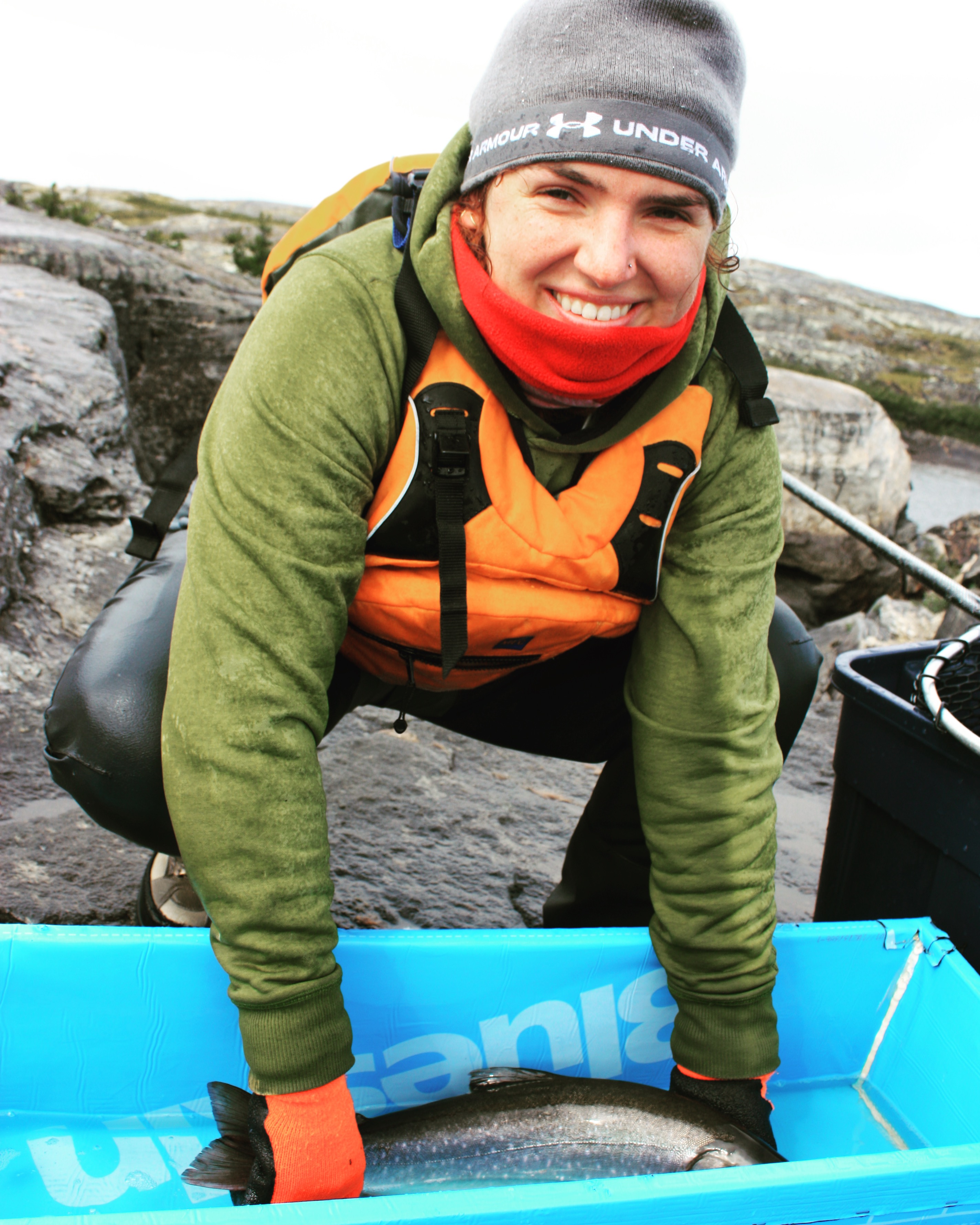
What's next for you?
I'm the first person in my immediate family to pursue a post-secondary education, and fisheries and related research topics have been my focus throughout my academic career. My undergraduate degree developed my passion for fisheries research and finding sustainable solutions and, as such, I was inspired to pursue my academic career with graduate studies in a similar field. This led me to my Master's degree, where my community-initiated project enabled me to study a subject I find fascinating, as well as develop skills in the field and laboratory. My Master's also provided invaluable opportunities for Aboriginal community engagement, an aspect of northern research that I continually champion. My PhD allowed me to pursue my interests in fisheries-related research in the North, acquire new skills and knowledge, and continually engage with aboriginal communities, all of which I'm passionate about. All in all, my post-secondary education has lasted ten and a half years to date.
As for where things are going? This summer, I'll also be starting work as a fisheries biologist for the Makivik Corporation. As the funding for my doctoral project draws to a close, I've had to accept a paid position to continue supporting myself while writing my thesis. Although I have to work simultaneously while pursuing my PhD, this position is my definition of a dream job. I will be able to continue to participate in field work, sample collection, laboratory analysis, data analysis, report writing and presentations.
I've always said I wanted a job that would allow me to touch all aspects of science, and this position makes that happen. Most importantly, it will allow me to continue my work with aboriginal communities to ensure that their fish populations experience continued success in the face of large-scale climate change. On a more personal note, working in this position will also allow me to pursue some of my main educational and professional goals, which are to empower and inspire other aboriginal women to pursue careers in the applied sciences, and to continue to indigenize research that is conducted on traditional aboriginal territories across Canada.
Fares Saidi, doctoral student in biology
What brought you to INRS? Tell us about your experience.
The place of research and the importance attached to it at INRS is the main thing that led me to do a PhD here. Everything is done to enable students to turn their ideas and projects into reality, with all the materials they need to succeed. I've been able to enrich my scientific knowledge through daily exchanges with my supervisor, Professor Salim Timo Islam, and the colleagues I've worked with.
Tell us about the research challenge and impact of your doctoral project?
My PhD work focused on characterizing the production of bacterial polysaccharides by the Wzx/Wzy-dependent machinery, which is the most widespread polysaccharide production machinery in the bacterial world, and their effects on the multicellular physiology of the developmental model bacterium Myxococcus xanthus. We have highlighted a new model for the Wzx/Wzy-dependent machinery completely challenging the dogma and way of apprehending these machineries and our understanding of bacterial polysaccharide production of the Wzx/Wzy-dependent machinery.
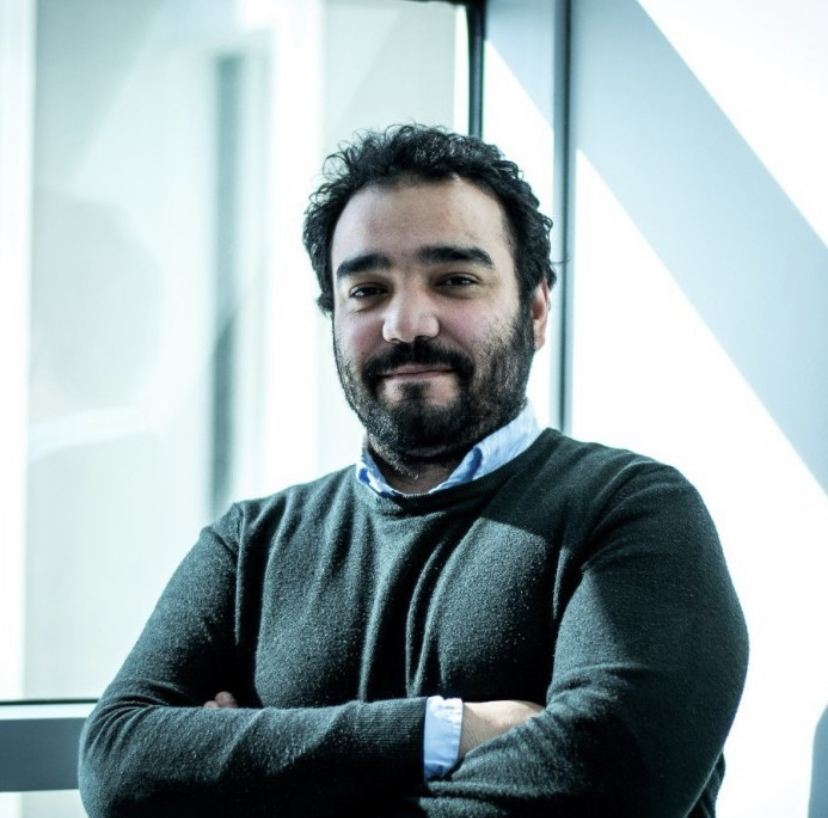
For me, this scholarship is a token of gratitude for all the work I’ve put in over the years by my supervisor, Professor Salim Timo Islam, our many collaborators at INRS and other Canadian and international institutions, and by myself. It’s a recognition that makes me even more determined to surpass myself in the future. It is also a sign of gratitude to the people who have surrounded me, guided me and helped me throughout my studies, and without whom I would not have succeeded in my work.
How do you see the future?
On the strength of this recognition and support, I’d like to continue my work on the study of bacterial polysaccharides. Then, I plan to undertake a post-doctorate to further develop my scientific leadership. During my studies, I benefited from a great deal of support and encouragement that strengthened my vocation. That's why I want to get more involved in training students and helping them to succeed.
About the Université du Québec Scholarships
Valued at $3,000, theUniversité du Québec scholarships are being offered for the first time in 2023 to promote accessibility to university studies and to enhance the diversity of the student community at INRS. These scholarships enhance the study conditions offered by INRS to the winners.
The competition opened in March and closed on April 5, 2023. It was managed by the Service des études supérieures et de la réussite étudiante (SESRE) and attracted a great deal of interest from the student community.
The INRS Foundation warmly thanks the SESRE team for its assistance and the members of the selection committee, Mr Philippe-Edwin Bélanger, Ms Joanie Lavoie, Ms Léa-Maude Gobeille-Paré, Pre Sophie Duchesne and Pr Claude Fortin for their essential contribution.
Thank you to all those who applied, helped publicize and run the competition, and to the generous donors of the Fondation de l'Université du Québec for their invaluable support.
VISIT THE SCHOLARSHIP DIRECTORY
